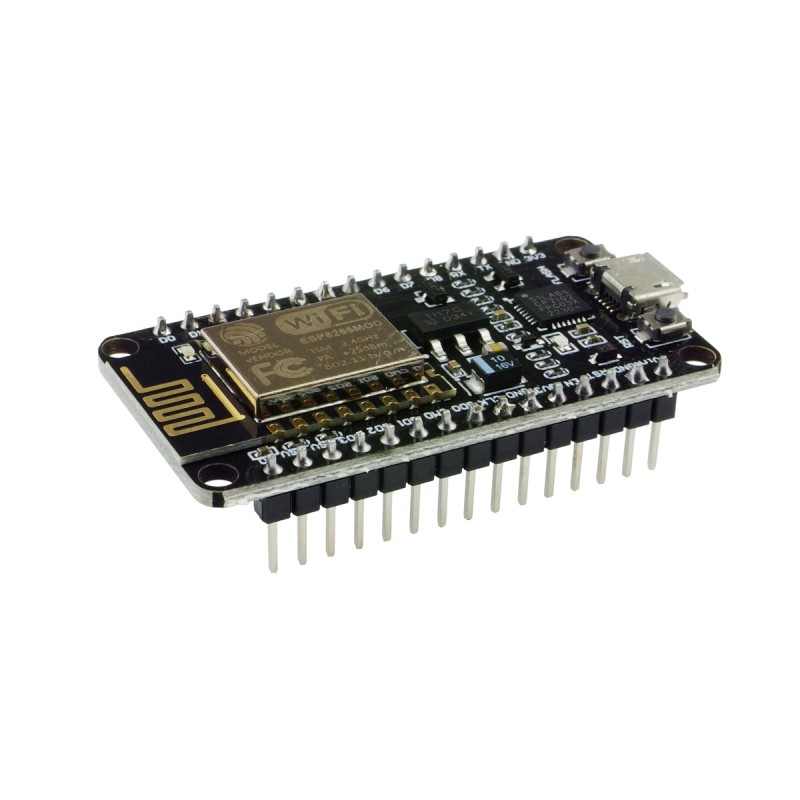






zł15.84 tax excl.
WiFi module based on ESP8266. The module has a built-in antenna and USB-UART converter. The module can be programmed in Lua (under the control of the NodeMCU firmware) or in the Arduino environment. 10 GPIO lines are available which each can be configured to work as PWM, I2C.
This WiFi module is based on ESP8266, unlike other modules with ESP8266 this is equipped with a built-in USB UART converter, so you do not need anything more to start programming the module. There are 10 GPIO lines available to the user, each of these lines can be used as an I2C interface line, 1-Wire or as a PWM line. The module can work under the control of the NodeMCU firmware, it can be programmed directly from the Arduino IDE after installing the appropriate plugins.
Data sheet
Manufacturer BTC Korporacja sp. z o. o. Lwowska 5 05-120 Legionowo Poland sprzedaz@kamami.pl 22 767 36 20
Responsible person BTC Korporacja sp. z o. o. Lwowska 5 05-120 Legionowo Poland sprzedaz@kamami.pl 22 767 36 20
The base board for the Wi-Fi NodeMCU module (ESP-12E), thanks to the built-in L293DD system, allows for attaching e.g. motors, electromagnets or other executive devices. The I/O lines of the NodeMCU module were derived to the pin connectors, and the power supply can be connected with the use of screw connectors. ESP12E Motor Shield
RN-171 Series 54 Mbps 2.4GHz SMT WiFly GSX 802.11 b/g Wireless LAN module, MICROCHIP, RoHS
Development board in Feather format equipped with AW-CU488. The module has an integrated WiFi wireless communication controller, LiPo charging circuit and Qwiic connector. SparkFun DEV-19957
No product available!
Connect your Arduino-compatible to the Internet with this WiFi shield that features the FCC-certified ATWINC1500 module from Atmel. Adafruit 3654
The expansion board (shield) with the DA16200 WiFi module. It is equipped with a Qwiic connector and is an excellent solution for IoT projects. SparkFun WRL-18567
Board for applications in the area of the Internet of Things (IoT). The module is based on the ESP-WROOM-32E system with 240 MHz clock, equipped with 4 MB Flash and 520 KB SRAM, as well as WiFi and Bluetooth communication. DFRobot DFR0654
A WiFi overlay designed for the OpenMV camera that adds wireless internet connectivity. It is equipped with an ATWINC1500 WiFi module. SparkFun WRL-16776
No product available!
With an integrated ESP8266 WiFi controller this module is a one-stop shop for almost any Internet-connected project. Firmware can be developed in Arduino and uploaded over a simple, serial interface. WRL-13711
Evaluation set for IoT applications. Rich set of equipment in such peripheral systems as WiFi, OLED display, headphones, microphone, sensors (temperature, humidity, motion, pressure) make it a complete tool that will be used in many projects. DFRobot DFR0512
WiFi module developed by AI-Thinker Co., Ltd with ESP8266 processor. Integrates a 32-bit MCU microcontroller with 80 MHz clock, RTOS support, Wi-Fi and antenna. The module supports the IEEE802.11 b / g / ni standard and has a complete TCP / IP protocol stack. AI-Thinker ESP-12S
The Wio RP2040 module is an advanced Wi-Fi chip designed for IoT projects. Equipped with a powerful Raspberry Pi RP2040 processor and an ESP8285 Wi-Fi chip, it provides stable wireless connectivity. It is compatible with popular programming environments such as C/C++ and MicroPython. SeeedStudio 102991556
Compact Wi-Fi bridge for short to medium-range network transmission. With the advanced iPoll 3 protocol and support for multiple services, it is ideal for various video surveillance scenarios. Its IP-66 rated housing ensures weather resistance
Powerful, generic Wi-Fi+BT+BLE MCU modules that target a wide variety of applications, ranging from low-power sensor networks to the most demanding tasks, such as voice encoding, music streaming and MP3 decoding. Espressif ESP32-WROOM-32E 32MBit (4MB)
Module from the ESP32 series, combining a powerful microcontroller, Wi-Fi and Bluetooth 4.2 BLE. ESP-WROVER-B has a built-in PCB antenna, a large number of GPIO lines and small dimensions. Adafruit 3979
Comprehensive development platform for Espressif ESP32 a WiFi-compatible microcontroller and nearly 30 I/O pins. DEV-13907
Board for applications in the area of the Internet of Things (IoT). The module is based on the ESP-WROOM-32E system with 240 MHz clock, equipped with 4 MB Flash and 520 KB SRAM, as well as WiFi and Bluetooth communication. DFrobot DFR0654-F
No product available!
WIFI-LPB100-A module Eval Kit enables UART data transmission via WiFi, ultra low power consumption, encrypted communication
No product available!

WiFi module based on ESP8266. The module has a built-in antenna and USB-UART converter. The module can be programmed in Lua (under the control of the NodeMCU firmware) or in the Arduino environment. 10 GPIO lines are available which each can be configured to work as PWM, I2C.
